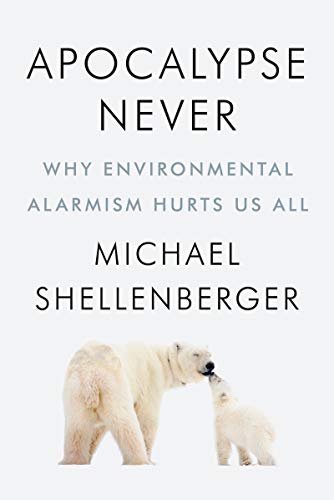Environmentalist and climate activist Michael Shellenberger recently published a controversial book titled “Apocalypse Never: Why Environmental Alarmism Hurts Us All”. In his book, Shellenberger argues that much of the environmental activism and alarmism happening today is misplaced, and that many of the proposed solutions to environmental issues will do more harm than good. Top scientists such as James E. Hansen, the “father of climate change” and the author of “Storms of My Grandchildren”, endorsed the book and stated that it is exactly what is needed to clear up the exaggerated and panic-stricken misinformation about climate.
“Environmentalists have been better at inventing myths than at describing reality. This is why so many people, including intellectuals, have fallen for climate change: it offers a compelling narrative about the end of the world. But the facts are often more prosaic, and less apocalyptic, than they appear.”
Here are the top 10 lessons we can learn from “Apocalypse Never”:
Lesson 1: Climate Change is Serious, But Not an Emergency
While climate change is a real and serious issue, it is not the emergency that many environmentalists make it out to be. Shellenberger argues that the data suggests that we have more time to address climate change than originally thought, and that more moderate approaches to reducing emissions and adapting to climate change will be more effective than the extreme tactics pushed by some environmental groups.
Lesson 2: Energy Poverty is a Major Issue
Shellenberger argues that energy poverty is a much greater concern than climate change in much of the developing world. Access to reliable and affordable energy is necessary for economic growth and human well-being, and environmental policies that limit energy access can actually hurt the poor and vulnerable populations around the world.
Lesson 3: Nuclear Power is a Safe and Effective Energy Source
Nuclear power may have gotten a bad rap over the years, but it is actually one of the safest and most effective energy sources we have. Shellenberger cites the evidence of the low number of casualties resulting from nuclear disasters (such as Chernobyl and Fukushima), and argues that nuclear power has the potential to provide reliable and low-carbon energy for the foreseeable future.
Lesson 4: Climate Change is Not the Only Environmental Issue
Environmentalists are often singularly focused on climate change to the exclusion of other important issues such as deforestation, habitat destruction, and overfishing. Shellenberger points out that the health of the natural world is multifaceted and requires a more nuanced approach to protection.
Lesson 5: Natural Gas is an Important Transition Fuel
Natural gas has the potential to be an important “transition fuel” as we move towards a renewable energy future. Shellenberger argues that natural gas is a cleaner and more reliable source of energy than coal, and that it can be used as a stepping stone towards a more sustainable energy system.
Lesson 6: Fossil Fuels are Here to Stay (For Now)
Despite the push towards renewable energy, fossil fuels will continue to be a major part of the global energy mix for the foreseeable future. Shellenberger argues that we need to work with the industry to reduce emissions and improve safety, rather than demonizing and trying to phase out these fuels altogether.
Lesson 7: Environmentalism Can Be Conducive to Peace and Security
Environmental issues can often result in conflict and instability, particularly when resources are scarce or threatened. Shellenberger argues that environmentalism can actually be conducive to peace and security, by encouraging cooperation and collaboration to protect and preserve natural resources.
Lesson 8: The Fear Mongering Tactics of Environmental Activists Are Counterproductive
Shellenberger argues that fear mongering tactics used by some environmental activists can actually be counterproductive by causing people to tune out and disengage from the conversation about environmental issues. Instead, he advocates for a more balanced and solutions-oriented approach to environmentalism.
Lesson 9: Indigenous Populations and Local Communities Should Be Partners in Conservation Efforts
Indigenous populations and local communities have a vested interest in protecting their natural resources and can be valuable partners in conservation efforts. Shellenberger argues that conservation strategies should take into account the cultural and economic needs of these communities.
Lesson 10: A Focus on Environmental Solutions Can Unite Us, Rather Than Divide Us
Rather than tearing us apart with differing viewpoints on environmentalism, Shellenberger argues that a focus on real solutions to environmental issues can unite us and bring us together. By engaging in constructive dialogue and cooperation, we can make progress towards a more sustainable future.
Conclusion
While controversial, “Apocalypse Never” provides valuable insights into the often-polarized conversation about environmentalism and climate change. The book challenges some of the prevailing wisdom about environmental issues and advocates for a more balanced and nuanced approach to conservation and sustainability. By considering the lessons outlined in the book, we can work towards a more constructive and united conversation about the future of our planet.

Apocalypse Never: Why Environmental Alarmism Hurts Us All
Michael Shellenberger


